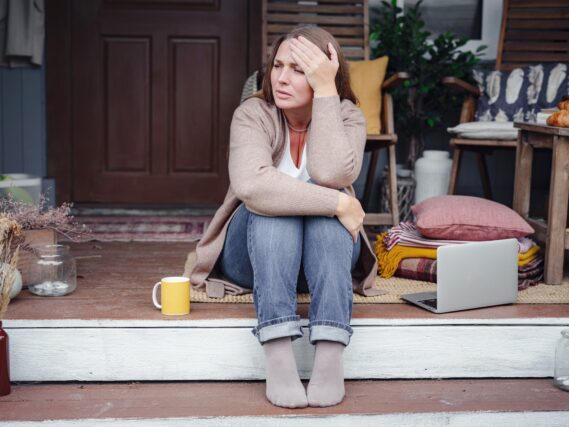Introversion often gets a bad rap, and it’s regularly mistaken for shyness or aloofness.

But being an introvert doesn’t mean you’re anti-social; it simply means you recharge by spending time alone. That being said, there’s a fine line between enjoying solitude and feeling lonely. If you’re wondering whether your introversion is masking a deeper longing for connection, these signs might offer some insight. Remember, there’s no shame in craving a bit of companionship — that just makes you human!
1. You feel a pang of envy when you see other people socialising.
 Source: Unsplash
Source: Unsplash While scrolling through social media or passing by a lively gathering, a sense of longing washes over you. You might tell yourself it’s just FOMO (fear of missing out), but deep down, you crave the connection and camaraderie that seems so effortless for other people. This feeling can be a sign that your introverted tendencies might be masking a desire for social interaction.
2. You find yourself constantly scrolling through social media.

Although you might not be actively participating in online conversations, you find yourself mindlessly scrolling through social media feeds. It’s not just about staying informed; it’s a way to vicariously experience the social interactions you’re missing out on. This behaviour could mean that you’re using technology as a substitute for real-life connections.
3. You’re hesitant to initiate conversations or make plans.

You might find yourself waiting for everyone else to reach out or make plans, even if you’re longing for company. This reluctance could stem from a fear of rejection or a belief that you’re not interesting enough. However, taking the initiative can be a powerful step towards overcoming loneliness and building meaningful relationships.
4. You feel a sense of emptiness even when you’re doing things you enjoy.

Whether it’s reading a book, watching a film, or pursuing a hobby, you might find that even enjoyable activities leave you feeling unfulfilled. This sense of emptiness could be a sign that you’re craving deeper connections and shared experiences.
5. You often cancel plans at the last minute.

While you might initially be excited about social events, as they approach, you find yourself making excuses or cancelling altogether. This could be due to anxiety, a fear of not fitting in, or a belief that you’ll be better off alone. However, pushing past these fears can open up opportunities for connection and joy.
6. You feel like you don’t truly belong anywhere.

Whether it’s in your workplace, social circles, or even within your family, you might feel like an outsider. This sense of not belonging can be a major contributor to loneliness, even if you’re surrounded by people. It might be a sign that you need to look for communities or people who share your interests and values.
7. You find it hard to open up to people.

Even when you’re with people you trust, you might find it hard to share your thoughts, feelings, and experiences. This could be a result of past hurts, a fear of vulnerability, or a belief that people won’t understand you. However, opening up and allowing yourself to be seen is essential for building deep and meaningful connections.
8. You feel like you’re constantly putting on a facade.

You might feel like you have to be someone you’re not in order to fit in or be accepted. This can be exhausting and isolating, leaving you feeling disconnected from both yourself and other people. It might be a sign that you need to try to find environments and relationships where you can be your authentic self.
9. You romanticise the idea of having a “best friend” or soulmate.
 Source: Unsplash
Source: Unsplash You might spend hours daydreaming about finding that one special person who will understand you completely and fill the void of loneliness. While close friendships and romantic relationships are important, this idealisation can set unrealistic expectations and prevent you from appreciating the connections you already have.
10. You compare yourself to other people and feel like you’re falling short.

When you see people who seem to have thriving social lives and fulfilling relationships, you might feel inadequate or like you’re missing out on something essential. This comparison can fuel feelings of loneliness and isolation, making it even harder to reach out and connect with other people.
11. You find it difficult to ask for help or support.
 Source: Unsplash
Source: Unsplash Even when you’re struggling, you might be reluctant to reach out to friends, family, or professionals for help. This could be due to a fear of burdening people, a belief that you should be able to handle things on your own, or a lack of trust in other people’s ability to support you. However, asking for help is a sign of strength, not weakness, and can be a crucial step towards overcoming loneliness.
12. You have a tendency to isolate yourself when you’re feeling down.

When you’re feeling lonely or overwhelmed, your instinct might be to withdraw and retreat into your own world. While solitude can be comforting in the short term, it can also perpetuate feelings of isolation and make it harder to connect with people. Reaching out to a trusted friend or family member can help you to feel less alone and more supported.
13. You feel a sense of relief when plans are cancelled.

While you might feel a twinge of disappointment, you also experience a sense of relief when social engagements are cancelled. This could be a sign that you’re using introversion as a shield to protect yourself from the perceived risks and challenges of social interaction.
14. You’re afraid of being judged or rejected by people.

This fear can be a major obstacle to building meaningful relationships. It might stem from past experiences of rejection or criticism, or from a belief that you’re not good enough. However, taking the risk to be vulnerable and put yourself out there is essential for overcoming loneliness.
15. You have difficulty maintaining long-term friendships or relationships.
 Source: Unsplash
Source: Unsplash Your relationships might start off strong, but then fizzle out or become strained over time. This could be due to a lack of communication, an inability to express your needs, or a fear of intimacy. Working on these areas can help you to build stronger, more lasting connections.
16. You feel a deep sense of shame or guilt about your loneliness.
 Source: Unsplash
Source: Unsplash You might believe that there’s something wrong with you for feeling lonely, or that you should be able to overcome it on your own. This self-blame can be incredibly isolating and prevent you from asking for the support you need. Remember, loneliness is a common human experience, and there’s no shame in reaching out for help.




